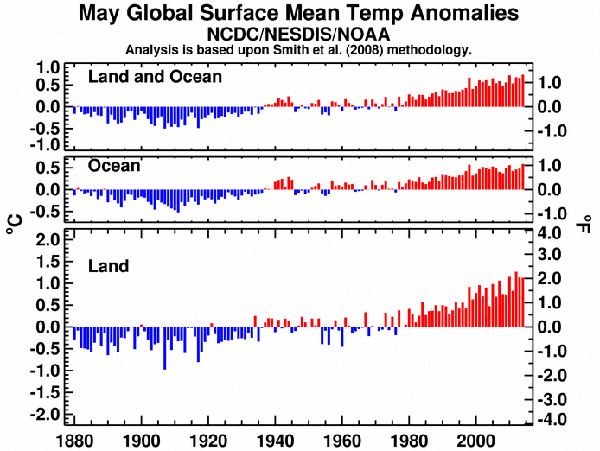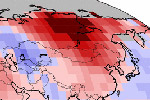Last month was the warmest May on record, according to new data from the National Oceanic and Atmospheric Administration (NOAA). While global land surface temperatures were the fourth warmest, it was the ocean surface where things really heated up. Sea surface temperatures were 0.59 Celsius (1.06 Fahrenheit) above the 20th Century average for May, tying with three other months for the largest departure from the average yet recorded.
On land, May brought especially warm weather to Australia, eastern Russia and central Asia, and portions of Canada and Alaska. In contrast, portions of the U.S., China, India, and Central Europe were cooler than usual. Over both land and sea, May was 0.74 degrees Celsius (1.33 degrees Fahrenheit) above the 20th Century average.
The new data means that the top three warmest Mays all occurred in the last five years: this year was the warmest, 2010 was the second, and 2012 the third.
To date, 2014 is the fifth warmest year on record, but that could change as scientists eye the northern Pacific Ocean for signs of El Niño conditions. El Niño, which starts with super-heated oceans, brings extreme weather and unusually warm conditions across large regions of the planet. In fact, many of the world’s hottest years—including 1998 and 2010—were El Niño years. Currently, NOAA says there is a 70 percent chance of an El Niño forming during the summer and an 80 percent chance during the fall and winter of this year.
Global warming—caused by burning fossil fuels, destruction of natural habitats, and industrialized agriculture—has raised the world’s temperature by approximately 0.8 degrees Celsius (1.44 degrees Fahrenheit) since the late 19th Century. While scientists have warned about the crisis for decades, governments have moved slowly to tackle it with greenhouse gas emissions continuing to rise.

May 2014 temperature departures as compared to a baseline of 1981-2010. Map courtesy of NOAA.

May temperatures since record keeping began: 1880-2014. Graph courtesy of NOAA.
Related articles
Global warming puts trillions at stake, but mitigation offers big economic gains
(06/25/2014) Two new reports this week look at the economics of global warming. The first, Risky Business, tallies the cost of climate change to the U.S., including tens-of-billions lost to destruction of coastal property, crop failures, drought, wildfires, and heatwaves. In contrast, the second report, by the World Bank, turns climate change economics on its head.
EPA carbon proposal may be crucial step in addressing global climate change
(06/10/2014) The U.S. Environmental Protection Agency’s (EPA) June 2nd regulation proposal hit all the expected chords. Following on the heels of a January regulation for new power plants, the Clean Power Plan focuses on all existing electric generation. By 2030, the plan aims to reduce 2005-level carbon dioxide emissions by 30 percent.
Ignoring boreal forests could speed up global warming

(06/04/2014) Greenhouse gas emissions from human activity have caused global air and sea surface temperatures to rise approximately 0.8 Celsius (1.4 degrees Fahrenheit) since the beginning of the 20th century, contributing to a plethora of problems worldwide from rising sea levels to desertification. A new study finds that global temperatures may start to increase even faster if more is not done to protect Earth’s boreal forests.
April 2014: 350th month in a row with temperatures above average
(06/04/2014) This April was notable for being the 350th month in a row where temperatures exceeded the 20th Century average. This means, monthly global temperatures have not fallen below average for even a single month since February 1985.
Turning point? U.S. and China announce major actions on global warming
(06/03/2014) Could 2014 be a turning point for efforts to slash global greenhouse gas emissions? Maybe: in less than 24 hours the world’s two largest emitters of carbon dioxide announced plans to finally rein-in the gas most responsible for global warming.
Animals bark, screech, and howl for action on global warming (PHOTOS)

(06/02/2014) On May 22nd, zoos and aquariums around the world creatively called for action on global warming. Dubbed ‘Show the Wild Face of Climate Change,’ the event involved over 70 institutions from 25 countries on all seven continents.
Upcoming EPA Proposal could put America back on track to lead on global warming

(05/27/2014) A regulation proposal on coal plants that the U.S. Environmental Protection Agency (EPA) will release in June could be great news for the climate change initiative. The EPA rolled out tough regulations on new constructions of electric generation facilities in January, but the nation’s 1,500 existing power plants were left unaffected.
April ties for warmest on record

(05/27/2014) Globally, this April was a scorcher, tying with 2010 for the warmest April on record, according to new data released by the National Oceanic and Atmospheric Administration (NOAA) last week. This makes 2014, to date, the sixth warmest year on record going back to 1880 when comparing the first four months.
Extreme cold and drought in U.S. linked to climate change

(05/23/2014) The U.S. Midwest and Northeast experienced one of the coldest, snowiest winters on record this past season. This might seem contrary to warming trends forecast by climate scientists, but a new analysis released today in Science points out that climate change caused by greenhouse gas emissions may actually have contributed to the well-below average temperatures seen in parts of the U.S.
Climate change’s ominous secret

(05/21/2014) Climate change is happening and humans are causing it, primarily from the increase in atmospheric carbon dioxide caused by burning fossil fuels. This much we know. The ‘secret’ comes from changes happening in the fast-warming Arctic: we may be surprisingly close to an Earth that supports far fewer humans than it does today.
Tipping point already reached? West Antarctica in slow-motion, unstoppable melt

(05/14/2014) Two hundred years from now, the planet could look very different. This week two landmark studies revealed that West Antarctica’s ice sheet is in a state of seemingly inevitable collapse linked to climate change. The slow-motion collapse would by itself eventually lead to a rise in global levels of 3.6-4.5 meters (12-15 feet).